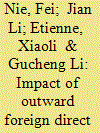|
|
|
Sort Order |
|
|
|
Items / Page
|
|
|
|
|
|
|
| Srl | Item |
| 1 |
ID:
150892


|
|
|
|
|
| Summary/Abstract |
The traditional energy utility business model is under pressure, and energy services are expected to play an important role for the energy transition. Experts and scholars argue that utilities need to innovate their business models, and transform from commodity suppliers to service providers. The transition from a product-oriented, capital-intensive business model based on tangible assets, towards a service-oriented, expense-intensive business model based on intangible assets may present great managerial and organizational challenges. Little research exists about such transitions for capital-intensive commodity providers, and particularly energy utilities, where the challenges to servitize are expected to be greatest. This qualitative paper explores the barriers to servitization within selected Swiss and German utility companies through a series of interviews with utility managers. One of them is ‘asset transformation’, the shift from tangible to intangible assets as major input factor for the value proposition, which is proposed as a driver for the complexity of business model transitions. Managers need to carefully manage those challenges, and find ways to operate both new service and established utility business models aside. Policy makers can support the transition of utilities through more favorable regulatory frameworks for energy services, and by supporting the exchange of knowledge in the industry.
|
|
|
|
|
|
|
|
|
|
|
|
|
|
|
|
| 2 |
ID:
191154


|
|
|
|
|
| Summary/Abstract |
This study examines the impact of outward foreign direct investment (OFDI) on Chinese manufacturing firms' financialization and servitization. Using a difference-in-differences approach with propensity score matching, we found that OFDI encouraged firms' financial and service activities. The effects of OFDI on financialization were stronger for firms specializing in short-term financial assets, operating in labor and technology-intensive sectors, investing overseas to pursue production, resources and markets there, and investing in non-OECD and Belt and Road Initiative (BRI) countries. Meanwhile, firms investing overseas were more likely to provide services at the sale or postsale stages. Outward foreign direct investment has also boosted the service activities of firms operating in the technology-intensive sector by investing overseas to seek resources and markets, as well as investing in non-OECD and BRI countries. Finally, OFDI partially influenced the extent of financialization and servitization of firms by affecting their profit-making ability.
|
|
|
|
|
|
|
|
|
|
|
|
|
|
|
|
| 3 |
ID:
150647


|
|
|
|
|
| Summary/Abstract |
Municipalities aiming at mitigating climate change by implementing new energy efficiency technologies face budgetary and capacity constraints. Outsourcing through energy service contracting could provide a solution. This paper reports results from a survey of 1298 municipalities concerning barriers to retrofitting public street lighting and the possible role of energy service contracting to overcome these barriers. Using a logistic regression analysis, the authors investigate determinants of opting for energy service contracts in the specific context of LED retrofits. Results point to an advantage of outsourcing in a financially and capacity-constrained environment, which corresponds with the main reasons for engaging in contracting: minimising investments and financial risks. However, municipalities often do not fully grasp the risks associated with retrofitting especially using a novel technology such as LED. In relation to that they underestimate the risk reduction potential of energy performance contracts (EPC). Previous experience with outsourcing increases the probability to engage in servitization although certain existing partnerships, particularly with utilities, prevent municipalities from considering energy performance contracts. Interestingly, engaging an energy consultant has a negative propensity to use energy service contracts, while pre-negotiated standardised contracts for energy performance contracts have a positive influence.
|
|
|
|
|
|
|
|
|
|
|
|
|
|
|
|
|
|
|
|
|